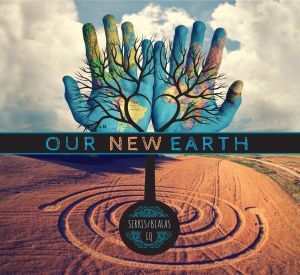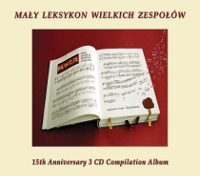This is the second album from Sirkis/Bialas International Quartet, a band formed around renowned drummer Asaf Sirkis and singer Sylvia Bialas. Sirkis (drums, crotales, konnakol, Manjira, frame drums) and Bialas (vocals, waterphone, konnakol) are joined by Frank Harrison (piano, keyboards) and Kevin Glasgow (six-string electric bass) to create something which may have its roots in jazz but blends and moves through so many other styles as well, taking their influences from the likes of contemporary classical music, Polish folk, Progressive rock, South Indian and Middle Eastern musics. The vocals are often used as an additional instrument, and there is never the feeling of a singer with a backing group, or an instrumental band where vocals are used sparingly for effect. Interestingly the compositions are split down the middle with half by Sirkas and half by Bialas, yet they blend together so the join is seamless. It did not surprise me at all that Bill Bruford was happy to write the sleeve notes, as in many ways this is a continuation of his own work. Remember this is a drummer who received a song credit on an improvised song, “Trio”, where although he was supposed to be playing instead decided the correct thing for the music was for him not to play a note. His approach is mimicked by Sirkas, who even on his own material may sit back and not play at all, or stay in the background, although there are times when he is far more forceful.
This is jazz being taken into new directions, with European folk being an important element. The band name may have just two in the title, but this is very much a match of four equals who all take leads and supporting roles as the need arises. Sirkas is an incredibly fluid drummer, as can be heard on “Reminiscence’ where he delicately plays around the kit, but can also provide bombast when required such as on “Letter To A.” where he and Bialas duel while Glasgow and Harrison stay in the background. Bialas has a non-Western approach to singing, due to her Polish upbringing, and this definitely has a substantial impact on the overall sound. She can flow through scales, provide the perfect melody, or improvise over the top where her vocals blend with the instruments seamlessly. Harrison’s delicate touch on piano is a delight throughout, as is his approach to using some keyboard sounds which are unusual in this context, such as church organ. Glasgow’s playing is also a delight, sometimes taking lead and using his six-string bass to produce guitar-like sounds, but at others providing sustained notes which provide warmth and foundation throughout the sounds.
It is an incredibly varied album, and one is never sure where one is going to be taken next, but the journey is always worthwhile and the results sublime. It is beautiful and delicate for the most part, but there are plenty of dynamics as the band switch and move.







